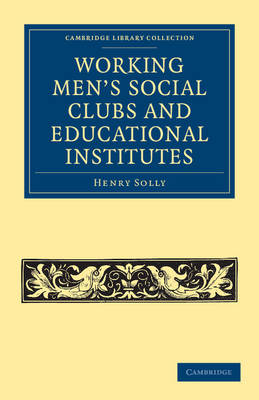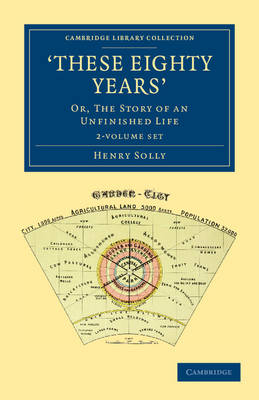Cambridge Library Collection - British and Irish History, 19th Century
1 primary work • 4 total works
Volume 1
Henry Solly (1813-1903) was a British Unitarian minister and social reformer who supported universal suffrage, the abolition of slavery and free education. He is remembered today for his contribution to the development of the working-class movement in late Victorian Britain, and especially for being involved in the foundation of institutions such as Working Men's Clubs, the Charity Organization Society and the Garden City movement. First published in 1893, this two-volume autobiography combines the account of Solly's personal life as a Unitarian minister and father of five with the various social, religious and educational movements he was involved with during his career as an activist. Volume 1 focuses on Solly's childhood and school days, and provides fascinating insight into Solly's early intellectual and political development, first as a student of University College London, then as a minister at the Unitarian Chapel at Yeovil, Somerset.
Social reformer, Chartist sympathiser, advocate of universal suffrage, and opponent of slavery, Henry Solly (1813–1903) was a man driven by the desire to stamp out inequality. As part of his mission to improve the lives of working-class people, he founded the Working Men's Club and Institute Union, becoming its first paid secretary in 1863. The Union encouraged the formation of social and educational clubs where working men could 'meet for conversation, business, and mental improvement, with the means of recreation and refreshment, free from intoxicating drinks'. His tireless campaigning led directly to the formation of the Charity Organization Society, which advocated the principle of aiding those prepared to help themselves. Published in 1867, this is Solly's vigorous manifesto for social reform based around temperance and the formation of social clubs and educational institutes for working men.
Henry Solly (1813-1903) was a British Unitarian minister and social reformer who supported universal suffrage, the abolition of slavery and free education. He is remembered today for his contribution to the development of the working-class movement in late Victorian Britain, and especially for being involved in the foundation of institutions such as Working Men's Clubs, the Charity Organization Society and the Garden City movement. First published in 1893, this two-volume autobiography combines the account of Solly's personal life as a Unitarian minister and father of five with the various social, religious and educational movements he was involved with during his career as an activist. Volume 2 focuses on Solly's later life as a minister and social campaigner, describing the development of the Club movement and other radical initiatives which would benefit the working classes in the nineteenth century.
Henry Solly (1813-1903) was a British Unitarian minister and social reformer who supported universal suffrage, the abolition of slavery and free education. He is remembered today for his contribution to the development of the working-class movement in late Victorian Britain, and especially for being involved in the foundation of institutions such as Working Men's Clubs, the Charity Organization Society and the Garden City movement. First published in 1893, this two-volume autobiography combines the account of Solly's personal life as a Unitarian minister and father of five with the various social, religious and educational movements he was involved with during his career as an activist. Volume 1 describes his early life and ministry, and Volume 2 covers with his work for social reform, recounting the development of the Club movement and other radical initiatives which would benefit the working classes in the nineteenth century.


